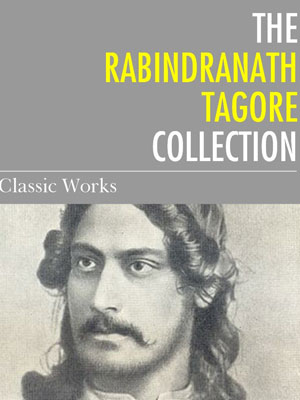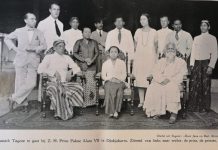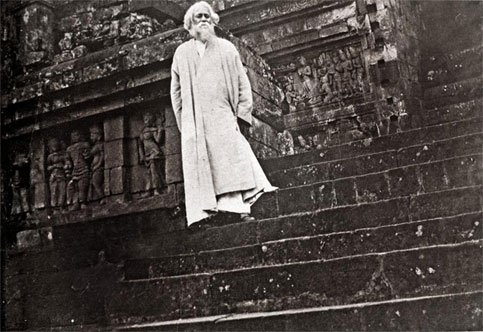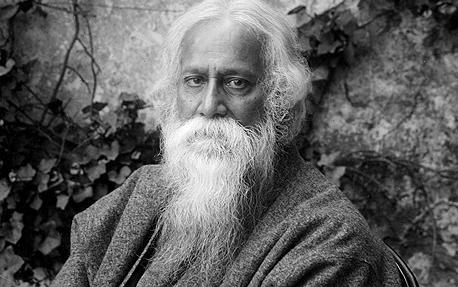47. Poem ‘Adhunika’ (Modernist) of the book ‘Prahasini’ (Satirist), written on the 15th February, 1935 at Lahore
[Translator’s note: One day, while discussing with Maitrayee Devi (MD) the style of old Bengali literature, the Poet said – “The artificiality of this kind of composition repeals us – so probably a day will come when what I am writing to-day, and what you like so much now, will not be liked. Who knows, there exists, disguised in a mask, much artificial and inferior stuff in my work? The evils that you have not been able to detect, will be found when this child of yours grows up and becomes a connoisseur. She would say, chiding you, “Mother, how funny you were…what did you ever find in Grandpa’s writings that you used to bubble up with admiration! Look at our Pankajaksha Babu’s (imaginary name of course) works… it is far more simple and natural. We don’t like Grandpa’s round about ways at all” ….but Grandpa’s only good fortune is that in his time mother was present to bubble with admiration and grand daughter was not. I have received enough cash, so why worry about future? Still, I wonder, can it be true, that there is nothing in literature, which does not depend on age… which is for all time…some good that is good for ever?…. .
Do you remember the poem that I wrote to Aparajita where I had flattered you (i.e. the modern ladies) a lot?…Say it…oh you must have forgotten!”]
MD- “Which part of it? –
‘Remember, this life is only a sacrifice at the altar of Death.
Whatever is permanent and whatever is unfit to preserve,
All fall as oblation in that flame.
Who can preserve the perishable with speeches?
Yet, the ember that remains after all are ashes,
Will speak for itself – it will speak.’
Are these lines you meant?”
Smiling appreciatively…………
Poet – “Yes, my dear, this life is only a sacrifice at the altar of Death, and this should be accepted with humility – and that being so…”
Read your letter – no comment,
But the heat therein does me foment;
In my poetic enthuse
Care for modern ladies I refuse –
Such impertinence monstrous if you suspect,
One mum on it is never a poet.
Take in good spirit my submission,
Condone please the shortfalls in expression.
As goes the calendars,
I’ve crossed seventy years.
On that calculation, my tenure
Soon to pass into oblivion, therefore.
Frequently while walking on my ways,
Flings me mud Death’s chariot wheel now-a-days.
Yet, this is my bliss at least,
Still eluding the clutch of the Archeologist.
Colorless now is this life worn out,
Yet, I’m born a modern devout;
Late nineteenth century A.D., not B.C. mind,
My female relations never comprised
Narad’s (1) auntie or that kind. (1)
I know, by a modern lady what is meant,
My poetic fame owes her eighty percent.
At her hand for ever,
I had my recompense, whatever.
The rhyme in my heart, I have left evidence,
Is tuned to the modern ladies’ cadence..
Do I get her close or lose, her reminiscence
Is till date my song’s essence;
The messengers to my mind – in my bower
My songs their excellence only did shower.
In olden times, Kalidas (2), Barruchi (2) and sundry (2)
The royal beauties being subject of their flattery –
In whose glory enlivened their flute
They were all modern astute.
Time without modernist there was never,
With their grace flowered literature.
The male poet destined by which star,
Gets such favor for ever?
Barefoot or in jingle, or slippers on
Paraded the modernists every generation.
They inspire man’s flight into dream,
Wherefrom to draw his song’s cream.
Yet, if any lady in poet’s composition
Spots ingratitude, it is mere deception.
Sweet and sour, true and false clatter
To yield delight in literary matter.
Between sweet and sour, marking the spurious one,
In poet’s art let remain undone.
Ah! Did you say it’s a satire?
Such twists let remain veiled better.
Irresistible indeed for this inclination
For an insensible derision.
So is my intemperate chatter,
Hope you excuse, as it does not matter.
Whatever I may not, this I’ll say sure,
We carry beggar’s bowl at your door.
The alms you fill in, there’s nectar latent,
Its price I meet, only to some extent.
Many a song I sang with my heart sincere,
You did audience that at least with your ear.
Gentlemen, very un-gently are critical,
Only your words are then palatable.
“Why! What’s wrong?”, you ask out of compassion.
“Hair split not rhyming lapses” – charge the critic head on;
“How many have been blest this much
Though numerous aimed Bharati (3) in their clutch?” (3)
Hereafter, when in dust I leave my flute behind,
If you can, drive me out of your mind.
The new poet in southern wind on that day,
Will sing your glory to resound the season’s gay.
Then, if in my moth eaten book
Even a line will have your mind shook,
My heart will tremble all of a sudden,
While I’m on my voyage to the heaven.
But what nonsense, why this fantasy?
People do call it sheer sentimentality.
Craze to live post-mortem is mere childish,
On earth, nothing could be more foolish.
Neither the Modernist will this endure,
In her estimation I’ll go down sure.
So, with rope (4) and pitcher (4) to death be done, (4)
Drowning the mid-Victorian.
Your shedding tear, will no fruit bear,
The parched smile, so be left in the rear.
At the farewell moment, why a heavy heart
The concluding hours let pass in wits smart.
Let remain in your faces the flashes of smile,
No offence please despite my seriousness awhile.
At times I encountered some of you aglow,
Not temporal, but in perennial flow.
I’ll tell this in my confession here,
It’s no passing charm in such get together.
At life’s dusk in their honor
Last sunrays record them golden in my memoir.
The nectar comprised in their aesthetic shower,
A bit of it spills into my mundane bower;
How I, a mortal, its perception will fate,
If I’ll miss them here incarnate?
In our life lapses numerous
With forbearance did they pass.
The lamp of love they lit up holy,
Illumined to turn things comely.
The shower of everything delightful
Turned sacred by their touch beautiful.
On this side of life befell me precious whatever,
Who can ferry it on death to the other?
Yet, on the night of death is my perseverance
To take their love as sustenance.
But enough is enough, at journey’s
end I better take the signal,
That the time I’ve now landed is too cynical.
But something is there, deep breathe of which
Sustains my latent faith without a breach.
Have patience please, something more I’ve to say,
After that, to the other end of discourse I’ll pass away;
Dig not your reminiscence for one who is gone,
Stretch not the seat for your shadow guest in the oblivion.
The ritual of condolence every year,
Only the reminiscence this falsity does shatter.
Crowding for a ceremony of a standard emotion
Cautious against lapses of rule violation;
In Bharat (5) there was no such craze farcical (5)
The onus was the poet’s for his own memorial.
“I’ll forget not” – such a cry
The Fate listens never, so it’s for whose good and why?
The unwitting oblivion which is natural,
That alone for heart is congenial.
Digging desert for a parched source,
To lit up the fuel less lamp the frenzied effort goes,
Chasing the bull non-existent,
Compounding all futile persistent –
Be sure, it is vigor’s pointless diffuse
Neither a good way to enthuse.
Mind you, in life itself tributes to Death go
The lasting ones, and those not so,
Are all consigned to its flame,
Who can hold the elusive by mere speech game?
Whatever remnant after the burn,
Will speak for itself in the final turn.
- Narad’s auntie – As Indian mythology goes, Narad was a sage in ancient India who often used to work as a messenger between the Heaven and the Earth. He was notorious for misinformation also, which caused misunderstanding among the concerned persons. However, he was a good arbiter also and settled many a dispute. Now, Narad himself being ancient, his Pishi (thus one’s father’s sisters are addressed in Bengal) has to be totally antiquated and so the old fashioned women are looked down upon as Narader Pishi (best English equivalent is possibly ‘Narad’s auntie’)
- Kalidas and Barruchi, authors of classics in Sanskrit, were the Poet Laureates in the court of King Vikramaditya (who ruled around 600 A.D.) among the nine jewels (i.e. eminent persons).
- Bharati, alias Saraswati, is the Goddess of Learning whose worship is widely celebrated in Bengal, particularly by the student community, time for which is generally in the month of February.
- Rope and Pitcher – These were the handy tools available in the olden times of Bengal, particularly by the women to drown themselves in water.
- Bharat was the earlier name of India, also used in modern time.





